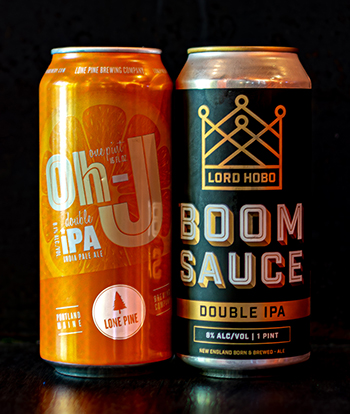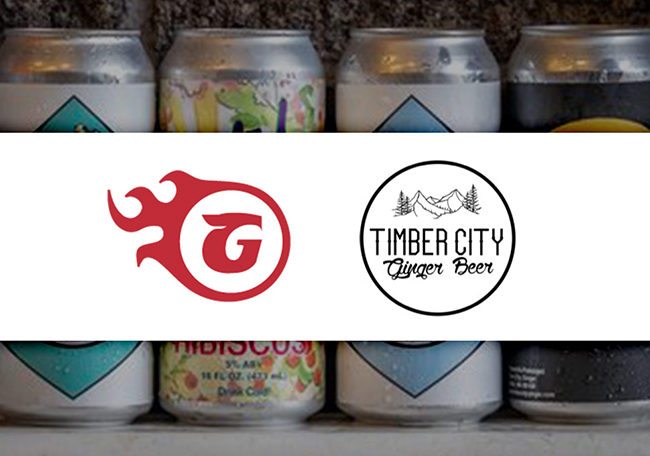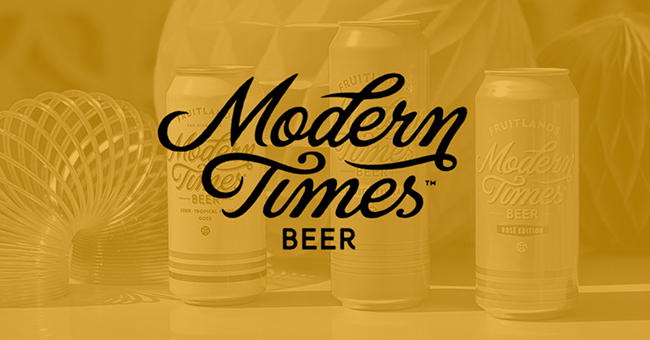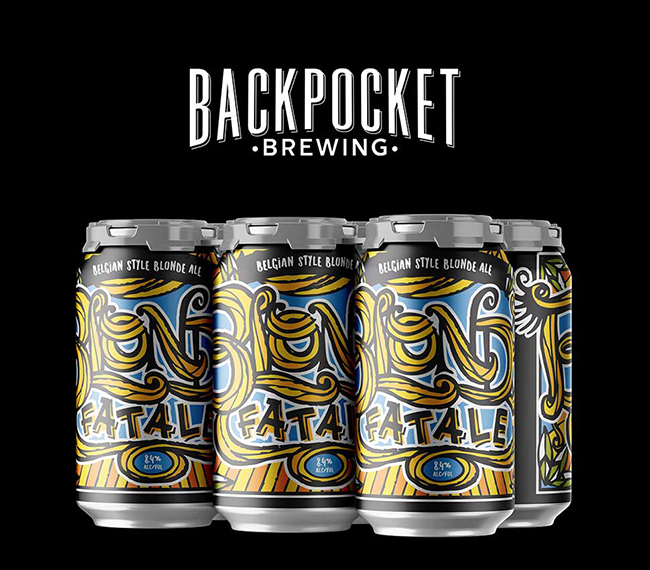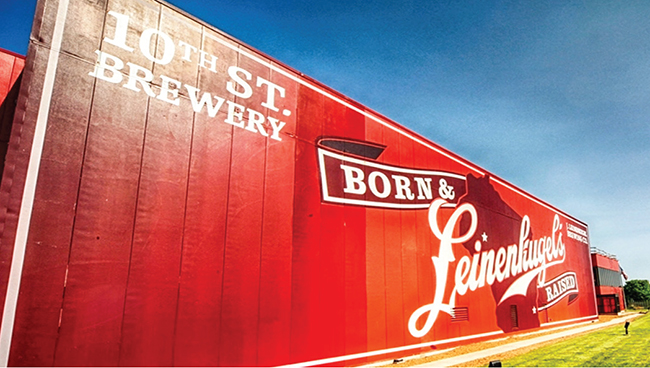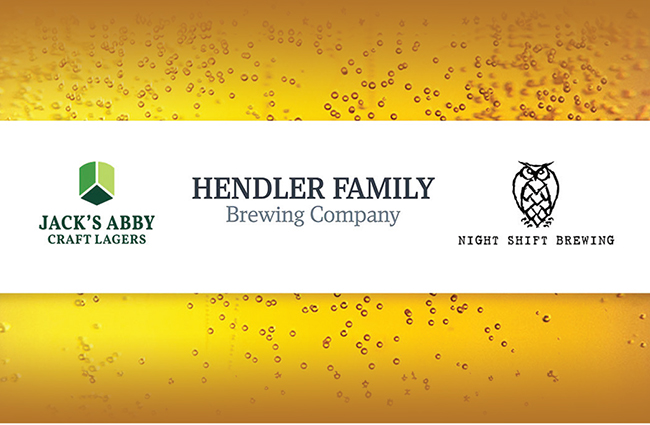Brewscape: The Latest Craft Beer Brand News
Lord Hobo Merges with Lone Pine Brewing
Lord Hobo Brewing and Lone Pine Brewing announced plans to merge in early November, bringing together a pair of New England craft breweries under a single ownership structure.
The companies declined to share financial terms of the transaction, which is expected to close in Q4, pending regulatory approval. However, Valterra Partners, the private equity firm that first acquired a minority stake in Lord Hobo in 2017, is the principal investor behind the new ownership group.
Woburn, Massachusetts-based Lord Hobo and Portland, Maine-based Lone Pine said the merger centers on a strategy of creating a platform for the “breweries to invest in brand-building, quality and innovation” in their home states.
“What we’re striving to do is to create something that’s quite different, which is a solution where we can thrive in craft, rather than just survive,” Lord Hobo CEO Simon Thorpe told Brewbound. “The basic idea of what we’re trying to build here is a platform that is focused very much on brands that can grow, that can stretch, can travel, can move across categories and brands that resonate with the consumer in a very deep way.
“So if you compare us with other platforms that are developing, there are some quite strong differences,” he continued.
Valterra co-CEO Scott Macintosh said in the announcement: “Having changed management and turned around both the financial health and growth trajectory of Lord Hobo in 2023, this merger represents an important second step in realizing our long-term vision of investing behind a scale, branded company that establishes itself as a pillar of the craft community in the Northeast. Bringing Tom [Madden] and John [Paul] into the combined company considerably strengthens our board, our leadership team and our culture.”
Under the new combined entity, both Lord Hobo and Lone Pine will maintain their own names and identities, director of marketing Aubree Karls told Brewbound.
Conversations between Lord Hobo and Lone Pine started in early 2023, but Lord Hobo’s search for a partner has been going on for three years, Thorpe said. In that time, the company has screened 400 breweries and entertained “serious discussions” with 12 in 2023.
Lord Hobo’s goals for growth are ambitious. Thorpe explained that companies need “somewhere in the region of $120 to $140 million in revenue to be credible.
“You need to be generating somewhere in the region of $20 to $25 million of EBITDA [earnings before interest, taxes, depreciation and amortization] to have the internal motor to really be able to do the things that you want to do,” he continued.
To do that, Lord Hobo is looking for partners with brands that “can grow and stretch relatively quickly” as well as other M&A deals to “bolt on additional scale to reach that cohesive critical mas,” Thorpe said.
Lone Pine’s deep Maine roots were extremely attractive to Lord Hobo, which recognized parallels to its own ties to Greater Boston, Thorpe said.
“The important part of this is that it’s not just at Lord Hobo, where we have brands like Boom Sauce, which really resonates at a deeper level, and 617, which is the local area code and really resonates inside Boston,” he said. “You’ve got a brand in Lone Pine that really resonates in Maine and the whole of New England, and it stands for something that is aspirational to people in the whole of the Northeast.”s
High school friends Tom Madden and John Paul founded Lone Pine in 2016. Madden and Paul will join Lord Hobo’s board of directors and will serve as the combined company’s COO and VP of sales, respectively.
Lone Pine has grown to include a production brewery in Gorham and taprooms in Portland, Westbrook and Old Orchard Beach, which the company will continue to invest in. The Portland location, on Anderson Street in the brewery-dense city’s East Bayside neighborhood, has particular potential for expansion.
The Gorham brewery has been running at its full 16,000 barrel capacity “with really no means to do anymore,” Madden told Brewbound.
“Part of our instigation for seeking partnership has been that we’ve been operating this facility at a critical mass for about three years now where we’ve had to outsource a fair amount of our production into contract brewing, especially during our peak seasons,” he said. “Maine is a very transient vacation state where we see a huge spike in sales in the summertime, and it’s been difficult to manage the peak and valley of the production process.”
Lone Pine’s volume will shift from contract brewing partners to Lord Hobo’s Woburn facility in time for next summer.
Georgetown Brewing Acquires Timber City Ginger Beer
Georgetown Brewing has acquired Timber City Ginger, a fellow Seattle-based ginger beer maker.
Ten-year-old Timber City’s portfolio includes both non-alcoholic (NA) and hard ginger beer, both of which Georgetown plans to continue producing.
“We are so honored to pass along all we have built to an incredible, local company that upholds the same principles we do: a love for our state and what it grows, tireless dedication to supporting Washington’s economy, a commitment to brewing and sharing quality products, and most importantly, a champion in community building,” Timber City co-founder Kara McKnight said in a press release.
“The team at Georgetown will help grow our spicy little beverage company the right way,” she continued.
Timber City’s NA and hard ginger beers start from the same base of ginger, water, lemon, organic cane sugar, sage and thyme, according to the brand’s website. Its NA offerings include Original Ginger Beer and a rotating seasonal variety.
Hard ginger beers include Timber City Imperial Ginger (7% ABV); South Sound Pounder (5% ABV), which is brewed with “seasonal rotating fruits and botanicals such as strawberry, cherry and peach;” and Timber City Celestial Seltzer (5% ABV), “herbaceous, dry, wine-based seltzers, highlighting seasonal botanicals.”
Maui Parent Company Spins Modern Times Off into Strategic Partnerships
Craft ‘Ohana announced a pair of “strategic partnerships” for the future of the Modern Times Beer brand and hospitality business that will see the Hawaii-headquartered company step back from the daily operations to “focus and double down” on growing Maui Brewing.
While Craft ‘Ohana will “retain an interest” in Modern Times, the company “will not be directly involved” in the daily operations.
Josh Landan-led brand house Wings & Arrow will oversee the Modern Times Beer business moving forward. Landan founded Saint Archer, the San Diego craft beer brand he later sold to Molson Coors in 2015, and later created the Ashland Hard Seltzer and Harland Brewing brands.
In addition to Wings & Arrow’s portion of the deal, a group led by San Diego businessman Duncan Ward has acquired the Modern Times Coffee brand and hospitality businesses. Ward’s LinkedIn page lists him as the executive chairman of Victoria Corporate Strategists, described as “corporate strategy and turnaround specialists” with expertise in restaurants, bars and coffee shops.
“As Maui Brewing Co. continues to experience significant growth, we recognized the need for strategic partnerships to help Modern Times flourish while enabling us to focus fully on our core Maui brands,” Craft ‘Ohana CEO Garrett Marrero said in the announcement. “We found two local San Diego-based partners who understand the nuances of Southern California’s market and bring deep expertise in their respective areas.
“This approach mirrors the leadership model we’ve successfully implemented at Maui Brewing Co. and Maui Brewing Restaurant Group to drive growth,” he continued
Landan added: “Modern Times is all I can hope for in a partner. I have watched the brand for many years and always believed in its potential. I am still reeling from the idea that I get to work on the brand each day, help to continue the great presence it has here in San Diego and future of a local fixture.”
For his part, Ward said a new Modern Times Beer + Coffee bar is planned to open in West Hollywood in early 2025.
American Cider Association CEO Michelle McGrath to Leave Trade Group At End of Year
American Cider Association (ACA) CEO Michelle McGrath will depart from her role at the trade association at the end of the year.
McGrath has led the ACA for more than eight years, serving as the group’s executive director and first CEO. At the time (2016), the ACA was the United States Association of Cider Makers, and was rebranded in 2020.
“Michelle has been instrumental at the helm of ACA for both our organization as well as for the cider industry,” ACA board president and Bauman’s Cider owner Christine Walter said in a press release.
“We will miss her creative, strategic, and compassionate leadership, but we are excited to see where her next endeavors take her,” Walter continued. “The board is grateful for Michelle’s 8 ½ years of service during which she reached many meaningful milestones for the ACA.”
“I’m really proud of what the board, staff, volunteers, partners, and members have accomplished together over the last 8+ years,” McGrath said. “It’s been a true honor to work with such inspiring people, and although I am ready to move to the next phase of my career, I will cherish my time and the relationships I’ve built at the ACA forever.
“It’s hard to express how much the people in this industry mean to me, and I’m incredibly grateful for the friendships and memories made. I was a cider fan before I took the reins at the ACA, and I’ll be a cider fan for life!”
McGrath did not share where her career will take her next, but “her championing of farmers will continue in her next role,” according to the ACA.
Iowa’s Backpocket Brewing Acquires Peace Tree Brewing Brand
Coralville, Iowa-based Backpocket Brewing has acquired the Peace Tree Brewing brand and recipes.
Peace Tree was founded by Megan McKay 15 years ago in Knoxville, Iowa, making it Iowa’s first 100% woman-owned brewery. McKay had sought a buyer for the brewery since last year, and the company ceased operations this summer.
“Selling to Backpocket Brewing allows Peace Tree’s legacy to live on, ensuring that our cherished brands will be continued to be enjoyed,” McKay said in the announcement of the sale.
Backpocket owner Aaron Vargas told Brewbound that McKay approached him about carrying the Peace Tree brand forward. He said he was honored to build upon her legacy, calling her “a trailblazer” in the Iowa craft brewing scene.
Peace Tree’s flagship Blonde Fatale will be the first beer to return to the market, starting Thanksgiving week, in 12 oz. can 6-packs with retro packaging and kegs in the Des Moines area via Doll Distributing. Peace Tree’s beers will also be offered in Backpocket’s taprooms in Coralville, Dubuque and the Des Moines suburb of Johnston.
Other Peace Tree brands are expected to follow in 2025.
Vargas is optimistic about Peace Tree’s ability to add volume to Backpocket, which produced 5,509 barrels of beer in 2023, according to data from the Brewers Association. Output for Peace Tree was not reported in 2023, but the company produced 3,108 barrels in 2022, according to data from the trade group.
“At its peak in 2019, Blonde Fatale did 4,000 barrels itself,” Vargas said. “My hope is to get 1,000-plus barrels of Peace Tree in 2025.”
Tom Holland, Industry Vets Team up to Launch Bero Non-Alcoholic Beer
The NA beer segment is getting a boost from the A-list.
Hollywood star Tom Holland’s new non-alcoholic (NA) beer brand Bero debuted in October with three styles, backed by consumer product-centric investment firm Imaginary Ventures and led by CEO John Herman, an energy drink veteran with 20 years of experience.
“For me, Bero is personal,” Holland said in a press release. “After two years on my sobriety journey, I wanted to create something that reflected my lifestyle and values. This beer isn’t just for those on a similar path, but for everyone who appreciates quality, craftsmanship and living life to the fullest. Bero delivers the taste and experience of a great brew, and never asks you to settle for less.”
The brand launch portfolio includes Kingston Golden Pils, Edge Hill Hazy IPA and Noon Wheat. All are pasteurized and available in 12 oz. can 6-, 12-, 18- and 24-packs, as well as variety 12-packs, according to the release.
Bero is selling directly to consumers (DTC) on its own website, with plans to launch nationally in Target in early 2025 via an in-progress network of beer distributors.
For the remainder of the fourth quarter of 2024, Bero’s strategy is to focus on the on-premise with a concentration on New York City and Los Angeles, Herman told Brewbound.
With Holland instantly recognizable to fans of the Marvel Cinematic Universe (he has played Spider-Man in Marvel films since 2015), the Bero team includes beverage industry veterans instantly recognizable to professionals in both beer and non-alcoholic beverages.
Herman tapped craft beer veteran Grant Wood as brewmaster. Wood co-founded Revolver, which Molson Coors acquired in 2016 and sold to Tilray this summer. Nutrabolt veteran Declan Duggan is serving as SVP of sales and distribution. Anheuser-Busch InBev alumna Jackie Widmann is Bero’s VP, head of marketing.
Molson Coors to Cease Operations at Tenth Street and Leinenkugel’s Chippewa Falls Breweries
Molson Coors will cease operations at the Leinenkugel’s Chippewa Falls brewery and the company’s Tenth Street Brewery in Milwaukee, effective January 17.
Brian Erhardt, EVP and chief supply chain officer, shared the news in a note to the company’s distributor partners, noting that production from the two Wisconsin facilities will transition to Molson Coors’ brewery in Milwaukee.
“We made the decision to close Tenth Street in Milwaukee in light of the sale of the Tenth & Blake breweries, as production at the facility included 19.2 oz. cans of those brands,” Erhardt wrote, referring to the sale of Atwater Brewery, Terrapin Beer Co., Hop Valley and Revolver to Tilray Brands for around $23 million earlier this year.
“In the case of Leinenkugel’s, this move follows the gradual shift of production of Leinie’s brands from Chippewa Falls to Milwaukee as the portfolio has grown over the years; Milwaukee already produces more than 75% of total Leinenkugel volume.”
The expiration of Molson Coors’ contract brewing arrangement with Pabst Brewing at the end of the year also made it possible for the Milwaukee production brewery “to absorb this incremental volume,” Erhardt wrote.
Erhardt stressed that Leinenkugel’s brand remains a “cherished part of our company and culture,” as it has since the craft brand’s 1988 acquisition.
“That’s not changing,” he wrote. “Leinie’s Summer Shandy and the rest of the portfolio will continue to play a critical role in our premiumization strategy.”
Summer Shandy is now a year-round offering. Erhardt added that the Leinie Lodge and pilot brewery in Chippewa Falls will remain open, and Molson Coors has “no planned changes” for the J. Leinenkugel’s Barrel Yard brewpub at American Family Field, the home stadium of the Milwaukee Brewers.
Ninety employees will be laid off as part of the move, according to a pair of federal WARN Act notices and Wisconsin Business Closing and Mass Layoff Law filings with the state’s Department of Workforce Development.
The company reported that 56 workers would be affected at Leinenkugel’s in Chippewa Falls and 34 at its Tenth Street Brewery in Milwaukee, with a layoff date of January 17, 2025.
Jack’s Abby Parent Company to Acquire Night Shift Brewing
Jack’s Abby and Hendler Family Brewing Company (HFB) are adding another Massachusetts brewery to their portfolio.
HFB has agreed to purchase Everett, Massachusetts-based Night Shift Brewing. The deal is expected to close in late 2024. Financial details were not disclosed.
With the deal, HFB becomes “Massachusetts’ largest craft beer producer,” with a projected annual production of 100,000 barrels in 2025. The joint company will employ 300 people, including “the vast majority” of Night Shift’s existing team,” according to the release.
“This expansion is not just about growth; it’s about building a stronger foundation for our teams and brands to thrive,” HFB and Jack’s Abby co-founder and CEO Sam Hendler said in the release. “By providing resources and stability to brands like Night Shift, Wormtown, and Jack’s Abby, we will ensure that Massachusetts’ craft beer industry remains local and independent for years to come.”
This is Jack’s Abby’s second major acquisition of 2024. The company announced plans to acquire fellow Massachusetts-based brewery Wormtown Brewery in April, along with the creation of parent company Hendler Family Brewing Co.
Night Shift as an idea was started in 2007 by then-roommates Rob Burns, Mike O’Mara and Michael Oxton, who began making beers for friends and family. The idea was turned into an official business in 2012. Burns also served as president of the Mass Brewers Guild from 2016 to 2020, when the role was taken over by Hendler.
Burns, O’Mara and Oxton “will help in the transition through the end of 2024, and then depart for new adventures elsewhere,” a spokesperson told Brewbound.
“We are proud to pass the torch to the Hendler Family Brewing Company,” Burns said in the release. “Their commitment to excellence and creativity aligns perfectly with our vision, ensuring that our brand will thrive for years to come. We believe that this strategic move creates the best possible future for Night Shift. We know that HFB will honor the values we built and continue to create exceptional experiences for our fans.”


Receive your free magazine!
Join thousands of other food and beverage professionals who utilize BevNET Magazine to stay up-to-date on current trends and news within the food and beverage world.
Receive your free copy of the magazine 6x per year in digital or print and utilize insights on consumer behavior, brand growth, category volume, and trend forecasting.
Subscribe